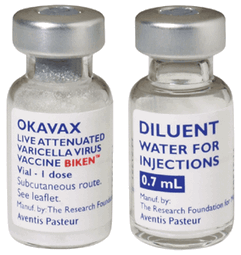Varicella vaccine – The vaccine against chickenpox
What is chickenpox?
Enable Vetryanaya, or chickenpox, as it is commonly called, It is a highly contagious infection. The disease causes chickenpox virus (BBO). The disease causes an itchy rash. It may lead to serious complications, especially in adults, Newborn and people with suppressed immune systems.
The virus of chickenpox spreads from person to person:
- Airborne moisture, which contains the virus;
- In direct contact with the fluid, and a rash of chickenpox.
The most contagious period is after the start of precipitation.
Symptoms of chickenpox include:
- Slightly headache;
- Mild fever;
- General feeling of malaise;
- Rash, consisting of a small, flat, red spots, which form round, itchy, fluid-filled blisters.
The development of chickenpox occupies about 10-21 days after contact with an infected person. The disease lasts 5-10 days. The rash usually develops on the skin above the waist, including the scalp. It can also appear on the eyelids, oral, upper respiratory tract, larynx, or on the genitals.
Treatment generally focuses on reducing itchiness, eg, using anti-itch cream. For rashes, who become infected, Antibiotics can be used. Antiviral drugs can be prescribed for adolescents and adults. For newborns and people with weakened immune systems, Immunoglobulin is administered after infection.
What is the varicella vaccine?
It is a live vaccine, which is administered by injection. Varicella vaccine may be given in a combination vaccine, called MMR, which protects against measles, mumps, Rubella, varicella.

When and who should get vaccinated against chickenpox?
The vaccine is recommended for most children 12-15 months. The second dose is given at age 4-6 years.
For those, who has not been vaccinated, recommended following vaccination schedule:
- To 13 years – 2 doses at intervals of 3 months between the first and second doses;
- 13 years and above – 2 dose, a minimum interval of 4 weeks between the first and second doses.
Adults, which have not been fully vaccinated and have never had chickenpox is recommended to be vaccinated. We must talk to your doctor, as the presence of certain diseases vaccination can not be carried.
If the parent or the child has not been vaccinated, but fell ill with chickenpox, vaccination for three days can help reduce the effect of the virus or provide protection against infection.
Risks, associated with varicella vaccine
Varicella vaccine, Like all vaccines can cause problems, eg, severe allergic reactions. The risk of serious harm or death is extremely small. Most people do not have any problems after vaccination.
The most common complaints are:
- Soreness or swelling around the injection site;
- Fever;
- A small eruption.
Very rarely after vaccination, cases of health deterioration were recorded, caused by fever, pneumonia and other serious problems (eg, blood disease).
There is some evidence, children, probably, may have problems after comprehensive vaccination, if they are given the MMR vaccine as the first vaccination. Parents are encouraged to keep in mind the risk of fever, and if it is possible to choose a method of vaccination.
Who should not get vaccinated against chickenpox?
Vaccination is not necessary in the following cases:
- For moderately ill persons. You need to wait, until the patient feels better;
- If a person is ill with chicken pox;
- If you have a life-threatening allergic reaction to gelatin, antibiotic neomycin, or to a previous dose of varicella vaccine;
- It is impossible to vaccinate pregnant women. You can be vaccinated after delivery;
- Women, who are trying to get pregnant, should wait 1 month after vaccination, to renew efforts to get pregnant.
We must talk to your doctor, before vaccination, If there are traces of the disease:
- HIV / AIDS or other disease, that affects the immune system;
- When treating drugs, which affect the immune system (eg, steroids);
- Cancer;
- If you recently blood transfusion.
What other ways besides vaccination can prevent chickenpox?
Avoiding contact with people, who have the virus can reduce the risk of disease.
What happens in the event of an outbreak of chicken pox?
In the event of an outbreak people, who have not had chickenpox or have not been vaccinated, You should be vaccinated.
